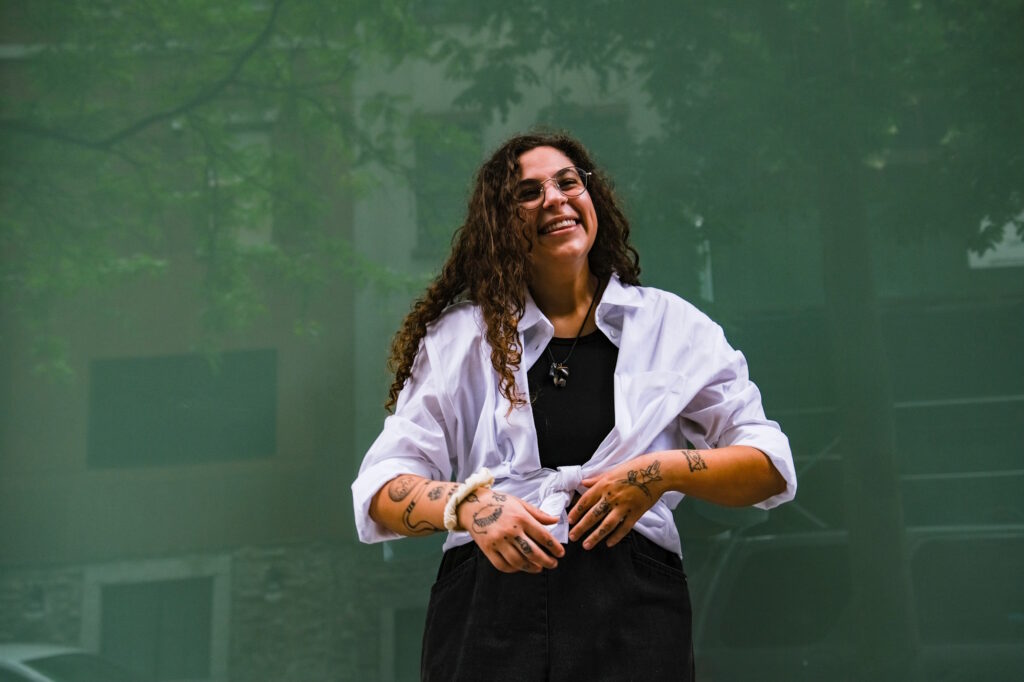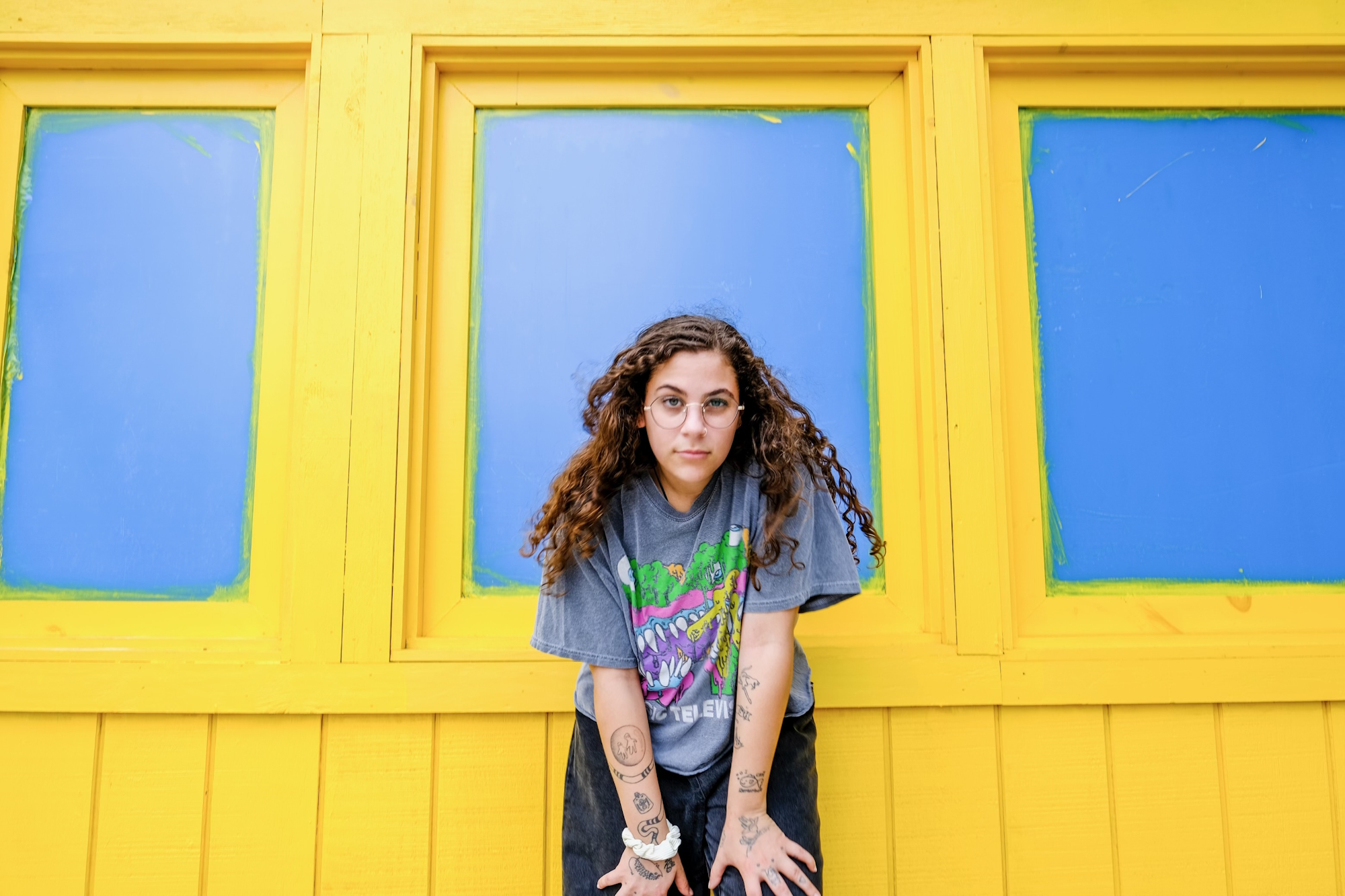In many ways, the current musical project of the twenty-one-year-old Miami-based singer-songwriter Julia Bhatt is something which could only have existed in the 21st Century. For example, Julia credits the 2006-founded streaming platform Spotify for the sonically diverse interest she has, which permeates her music. “I remember everybody listened to iTunes, and then it was Apple Music, and then everybody moved over to Spotify,” Julia recollects while in conversation with Post-Burnout. “And that, for me, is a very important thing that happened, just because Spotify is unique, in my opinion, because it’s not just, ‘Here’s the music you like;’ it’s, ‘Here’s what we think you’re going to like. Here’s everything that there is, and we’re going to tailor it to you.’
“So, growing up, first I listened to what my parents were listening to – so, The Beatles, The Rolling Stones, Crosby, Stills & Nash – all these older bands that I love; like, I love ‘70s soft rock and all that kind of shit. And then, my sister, who’s two years older than me, she started listening to alternative rock and all that kind of stuff, so I followed that and whatever. And then, as I got Spotify, I started developing my own taste, and that was really shaped by the kind of…like, essentially eighty different genres were presented to me at one time, and I was like, ‘Oh, I like all of them.’ So, after that point, it’s never been, ‘This is what I listen to.’
“Whenever people ask me what my music is, or what I listen to, or what my favourite genre is, or all this stuff, I have no answer, because I like so much, and that’s because I’ve been exposed to so much for so long. I understand how, back in the day, people could be like, ‘Oh, this is who I go see in concert, and this is who I own all the fucking tapes to and all the vinyls to, and all this shit.’ Then, I get how it’s more of a clear-cut answer, but, now, I just don’t understand how people can answer questions like, ‘Well, who’s your favourite artist?’ There’s so much going on all the time. There’s new music being put out every single day. It’s crazy.”
With this rounded interest, Julia fell in love with live music. “Concerts were the things that got me into music,” she remembers. “I was like, ‘That must feel amazing,’ to be up there and playing good music, and knowing that it’s good and feeling that it’s good and feeling that other people think it’s good and everyone’s having a good time.” As a teen, Julia began experiencing it for herself, when she would perform as the background musician in restaurants for tips and food. Even then, she showcased her range, playing everything from The Strokes to Ella Fitzgerald to Drake.
She remembers a specific incident when an elderly couple requested a song (which she can’t recollect) and slow danced together, and realised that she was now transcending joy onto other people with live music! “They were, like, proper slow dancing and having just a great time, and, in the least fucking selfish way I can say this, I gave that to them!” Julia says. “I was able to do that for them, and that made me feel so nice! It’s lovely to see people enjoying themselves, and that’s really all I want to do, is I want people to enjoy themselves when they hear music.”

Courtesy of Reybee, Inc.
After finishing high school, Julia began releasing cover songs online. She experienced some viral attention for this, but it was something which she, ultimately, didn’t find sustainable. “Something I will always say is that social media is incredibly fickle,” she says. “I find that there are gaps in time or, like, little spaces in time where it’s just the right moment at the right time. I know a ton of people who have gotten to where they are now because their music fit the vibe of that time and the mindset of that time and blah, blah, blah. All that stuff. And I think that’s kind of what happened to me, is I’ve always been interested in music, I had always written some stuff, and worked with people and played live and stuff, but I decided to do covers online and people really took to that, and it did grow my following a lot and gave me a platform, pretty much.
“And, it’s funny, since then, it’s gone down a lot in the last couple of years. Every week, honestly, I’ll lose, like, a thousand followers or something crazy like that. It’s kind of strange. It was a really cool opportunity. I’m really glad it happened, it got me to a lot of people who still listen to me today, which is awesome, but it isn’t something that I would recommend as, ‘This is how you’ve got to do it. This is the way to go,’ because it’s really not. It’s hard. It’s hard to keep up with that kind of stuff, and to try to keep people’s attention on you when attention is everchanging and there are other things to pay attention to. It’s very strange. It’s almost like a game of trying to keep people looking at you, and it’s not something that I want to play. [Laughs]”
For Julia, she felt that she never really fit neatly into “the scene” of her native Miami, and was quite surprised to find that when she began self-releasing her own music, she was attracting a global audience. “I think that ties into Instagram, I will say,” says Julia. “What the algorithm does is it gives your shit to everybody, right? It’s not like, ‘Here are the American people we think will like it;’ it’s, like, ‘Here’s everybody.’ So, early on, I noticed that I had a ton of people in fuckin’ France, and a ton of people in Turkey, and a ton of people in Germany, and all these places, and I was like, ‘I haven’t been to any of these places. I don’t know anybody from [these places].’
“Again, it just ties into that Spotify and that Instagram algorithm, that I was fortunate enough to have that profile for a while, where I was pretty big… – well, not ‘big.’ I wouldn’t call myself ‘big’ – but people were paying attention a little bit more, and that just happened on a bigger scale, because that’s what social media is, nowadays. Again, social media is fickle, but there are those few people who will hear it and go to your Spotify and follow it, and they’ll listen to every new release.”
In July of last year, after several years of releasing singles and EPs, Julia released her eleven-track debut album, it is what it is (whose title is a play on The Strokes’ 2001 debut, Is This It). For Julia, the process of making the album was more intensive than what she was expecting. Soon, she found music – her one reliably therapeutic escape – to be an additional cause of anxiety. Within the context of music being used for a feel-good time, Julia says, “That’s what music is for me, and when you try to pursue it as a career, it takes that away a lot of the time, because you have to start thinking about numbers, and what success is and what failure is, and what that means to you, and how other people are doing the same thing and having infinitely more success or infinitely more opportunities, and how do you get there and when do you know if you should just stop? When do you know if you should just give up and do a fucking normal job and do this on the side?
“Like that album I released – and it was my first album – and I was like, ‘This is going to be great.’ And it did fine; it didn’t do amazing, it didn’t do horrible. It did OK. And I was like, ‘I don’t know what I’m doing,’ and then I had to start talking to the PR people about making content so that I could promote this album, and that’s something I hate doing, because everything that I had to say, I put it in the music and, as you can tell, I’m not going to be the person who’s like, ‘Listen to my music! I’m so amazing! I’m so great! You should all listen to it!’ Because I don’t know. I don’t know if I believe that, fully. I’m just kind of fucked up, so I will never be fully confident in my music, and that is something I guess you need to be successful.”
Having poured all her music and lyrics into her debut album, and with the stress that came from making it and its ensuing promotion, Julia took a potentially indefinite sabbatical from music. But, thankfully, something made her come back. “Over the last couple of months, I’ve had reason to believe that maybe I’m not as shit as I think,” she says. “I’ve been in contact with somebody who kind of got me back into writing. Because after I wrote the EP that’s about to come out, I stopped again. I didn’t write, I didn’t listen to new music. And then this guy, who I really like, came into my DMs and was like, ‘Hey, I have a song. Would you like to work on it?’ and, ever since, I’ve been writing, and I really credit all my shit to him. But I am now able to think, ‘OK, I don’t have to do anything specific. I don’t have any rules. I don’t need to release an album. I don’t know what the fuck I’m doing.’”
Tomorrow sees the release of Julia’s latest EP, Grab Bag. As a return to form, Grab Bag harkens back to Julia’s Instagram days of carefree expression and performance of any given song which took her fancy. The four-track EP features two covers, Aminé’s “Charmander” and Broox’s “Mom”, and two originals, “For the World” and “Time.” “I will say, it is kind of a sad boi hour EP,” says Julia of Grab Bag. “There’s one pop song and the rest are all like, ‘Oh, she’s not happy!’” But for Julia, this is the first time she feels that she’s content with her work. “That’s what this EP is to me, these are songs I’m happy with,” she says.
Now, a rejuvenated Julia plans on taking the freedom she gets from self-releasing to get back to what she loves most. “I’m always kind of moving on to the next thing,” she says. “So, this EP, actually, we finished about six months ago. It’s been kind of just hanging around because we were waiting for a couple of things, like art and some other shit, and now I have literally a hundred more songs. [Laughs] So, now I’m thinking less about it. I kind of just want to get that EP released so I can start working on some other shit.”
Julia Bhatt’s new EP, Grab Bag, will be available to stream on all platforms from Friday. You can keep up to date with Julia’s music, live dates, and social media accounts on her website. Tune into our full interview here:

Aaron Kavanagh is the Founder and Editor-in-Chief of Post-Burnout. His writing can also be found in the Irish Daily Star, Buzz.ie, Totally Dublin, The GOO, Headstuff, New Noise Magazine, XS Noize, DSCVRD and more.

 POST-BURNOUT
POST-BURNOUT